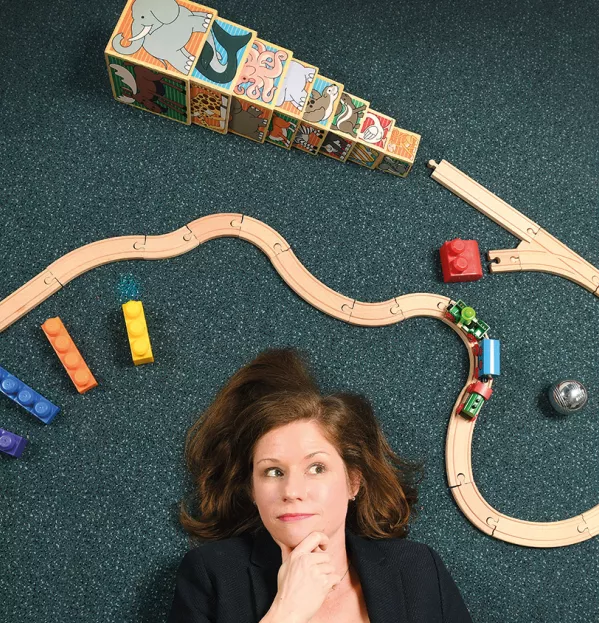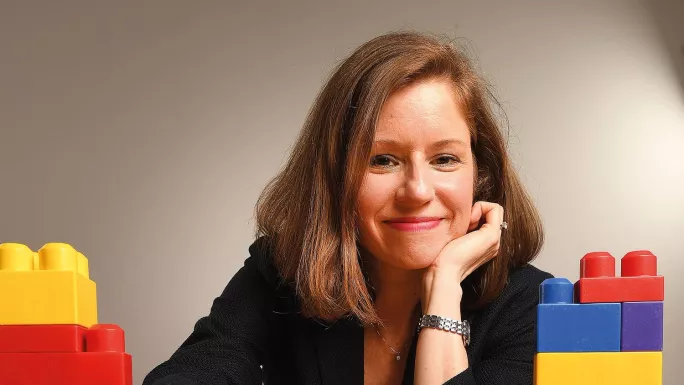Tes talks to...Sara Baker

In the University of Cambridge’s Donald McIntyre Building, which belongs to the Faculty of Education, there is an intriguing plaque. If you view it from one angle, you can clearly read the acronym Pedal; walk a little to the side and the words Play in Education, Development and Learning emerge as your perspective shifts. What you might not realise unless you look really closely, though, is that the sign is made from Lego.
It’s a fitting introduction to the work done by the Pedal centre, focused as it is on researching the serious business of play (and funded, as it is, by the Lego Foundation). Taking a closer look to find new revelations is also something Dr Sara Baker, one of the centre’s lead researchers, would implore educators to do when it comes to play.
The developmental psychologist says that, contrary to how it might at first seem, far from playtime being something that happens in between children’s learning, it is actually integral to the whole education process - and not just in the early years.
“We’ve pretty much accepted that play should be part of Reception and nursery classrooms, but as children get older, the way that play can support learning isn’t necessarily recognised or even really investigated enough for us to understand its significance,” she says.
“Maybe that’s partially because we forget that play can come in lots of different forms: from free play - the kind of thing that happens on the playground - to the kind of directed play that happens within the classroom.”
Another part of the problem might be our tendency to see children at different educational stages as being very different types of learners.
“The evidence doesn’t support the idea that children change suddenly from one year to the next, or that a Year 1 learner suddenly has drastically different needs to a Reception learner,” explains Baker. “There’s much more continuity, which means some principles of learning will apply across the lifespan.”
Ultimately, she believes that if we leave play behind in the early years, we might miss out on many of the benefits it can provide.
Chaos versus rigidity
So what is the point of play? And what advantages might there be in paying it more attention, even as children get older?
“Some of what we do is focused on looking at the role of the child in their own learning,” explains Baker. “The evidence suggests that far from being passive recipients of education, children bring a lot to the table and can actually be partners in their own development.
“You can treat children as active learners much more easily through a playful approach. When you give them freedom and a chance to direct their own interests, you often see increased motivation, engagement and even improved understanding of some learning content. Of course, we’re not advocating a complete free-for-all. But there’s definitely a balance between chaos and too much rigid structure.”
Critics might say that such ideas are great in theory, but difficult in practice. Well, one of the things that makes the work of the Pedal centre particularly interesting is its partnering of academics and teachers. The centre works with a core group of nine teachers who discuss ideas with Baker and her colleagues, then try out approaches in their own classrooms and report back (they also work with other teachers on a more ad hoc basis).
“I love seeing how the research about how children learn can be applied and translated, and I can’t do that on my own as a psychologist - it’s only working with teachers as co-researchers that lets me do this.
“They have the expertise about teaching and we have the expertise about psychology, so it’s really exciting to see the research coming to life in the real world.”

This tandem working means that Baker is acutely aware of some of the challenges in implementing more play-focused approaches.
“Sometimes, the teachers help us to see the limitations,” she says. “Sometimes we ask questions that teachers tell us aren’t what they really want the answers to…so they help to shape [our work], too.
“Something we’re exploring is the possible barriers to play. We know that giving children more autonomy can come up against more traditional practices. For instance, when learning is child-led, the learning outcomes are far less predictable than in a teacher-led lesson with a clear end goal in mind. And, of course, timetabled sessions don’t always lend themselves to children taking their learning off in an entirely different direction.
“That’s why we’re working with teachers to explore these potential issues. But there are no easy answers.”
Link with problem-solving
Baker is certain it is worth trying to overcome those barriers, because play could be critical in boosting a child’s capacity to solve problems.
“One of the big questions we’re trying to answer at the moment is to do with the link between play and problem-solving. We’ve got evidence on various pieces of the puzzle and we’re starting to think that the real question is more what kind of play might support problem-solving. Because if we give children autonomy and choice through a playful approach, they’re more likely to stick with a problem, more likely to be curious and ask questions, and more likely to be flexible, adaptable and effective collaborators.
“If we put these skills together, we’ve got a lot of the behaviours you need to be a good problem-solver.”
Working with the teacher partners, Baker is hopeful of making progress in this area. Interestingly, she says having a playful approach to the research is key to finding out what might work. Teachers are also being given the chance to adopt a playful mindset.
“We work with teachers like they work with children,” she explains. “Teachers need to be autonomous and creative, too; they need to play, too, to find the right thing for their classrooms. They need to try things out and see what works for them.
“Teachers bringing us fun examples of the types of playfulness they’ve invited into their classrooms is hugely valuable. One teacher created a den area in the centre of her room in which mysterious items were hidden. Children were able to go in and explore the items but the rule was that they couldn’t tell others what they’d seen.
“The curiosity, the self-regulation, the excitement that generated is a good example of how a simple play activity can generate quite complex responses.”
Spacial awareness
That’s obviously an example from lower down the education journey, where play is much more accepted. But Baker believes that this kind of role play can be helpful for older children, too, even if it looks rather different.
“Space matters - tweaking the space can invite playfulness in or shut it out,” she says. “Role-play areas in classes lower down the school can naturally evolve into, for example, the time and space to do drama activities with older children or seating arrangements that support the kind of discussion and open-ended activities that play requires.”
Ultimately, the heart of Baker’s research always comes back to partnerships: how teachers can create partnerships with children through play and how they can draw students into an active role that seems to be so crucial to their learning.
“By definition, play is something children choose to do,” she says. “It’s something that’s enjoyable. It’s something that’s child-led.”
Like the plaque at the Pedal centre, teachers will see such an approach in very different ways. But surely there is enough in what she has said above, and in the research published by Pedal, for even the most cynical teacher to take a second look at play. You never know, it might be more fun - and more beneficial - than you first thought.
You need a Tes subscription to read this article
Subscribe now to read this article and get other subscriber-only content:
- Unlimited access to all Tes magazine content
- Exclusive subscriber-only stories
- Award-winning email newsletters
Already a subscriber? Log in
You need a subscription to read this article
Subscribe now to read this article and get other subscriber-only content, including:
- Unlimited access to all Tes magazine content
- Exclusive subscriber-only stories
- Award-winning email newsletters